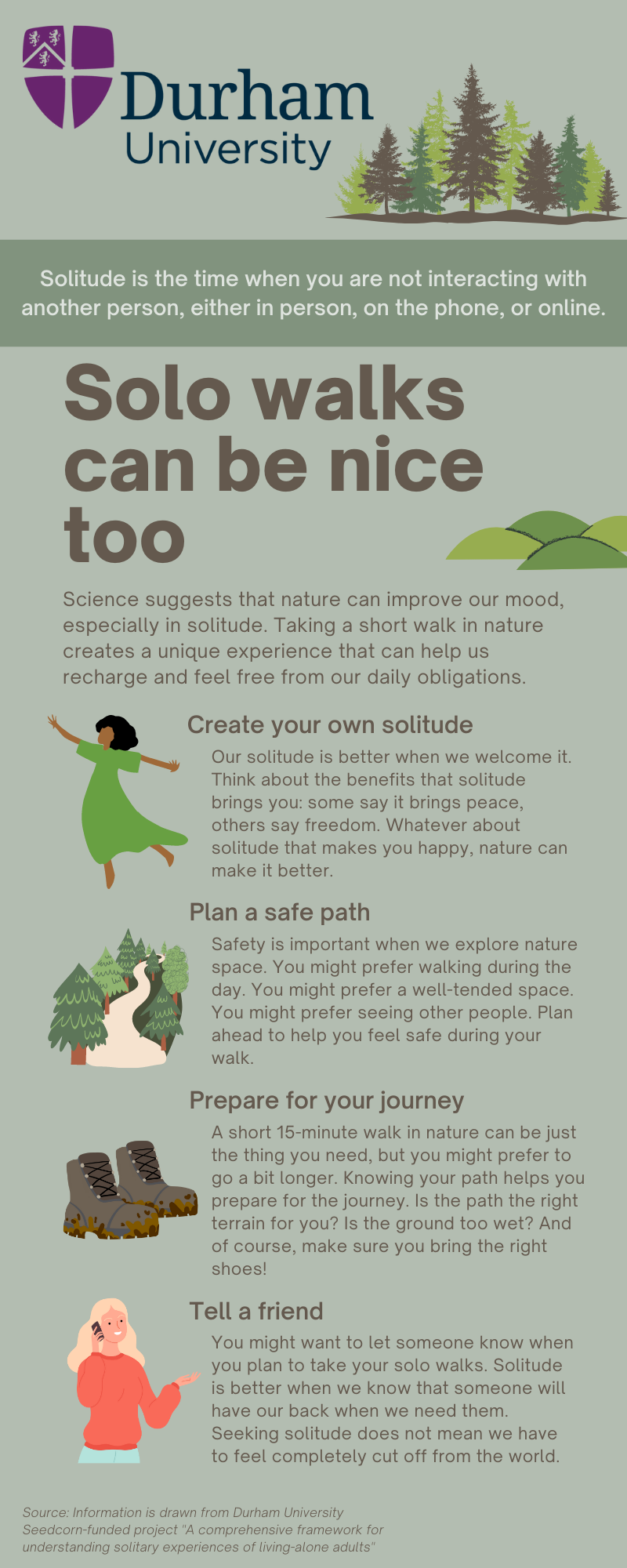Small doses of solitude
Dr Delali Konu, Pearl Tshimbalanga and Dr Thuy-vy Nguyen
Solitude Lab in the Department of Psychology.

At the start of the 2023, many of us might’ve felt excited to jump right back to work after the holiday break. Some might’ve felt a little overwhelmed catching up on tasks, emails and meetings. It’s normal to feel all these high-energy emotions at the start of term, but at the same time it’s OK to ease yourself in. Brief periods of solitude might be just what we need to take breaks throughout the day. In this article, Thuy-vy, Pearl and Delali share a few tips on how to get started on unlocking the power of solitude during our working day.
While solitude is often associated with loneliness, it can also bring calmness. The difference is feeling that we have a choice in when and how we spend time alone.
Reframe our attitudes toward solitude
With a busy schedule and our private lives, the idea of carving out long periods of time to enjoy solitude might seem something of a luxury. We recommend starting small: the key is to actively engage in finding time for yourself in small pockets.
To make a good start, it’s important to discover what it is about solitude that can benefit us. While solitude is often associated with loneliness, it can also bring calmness. The difference is feeling that we have a choice in when and how we spend time alone. One of the main benefits of solitude is that it allows space for rest and recharging which can improve wellbeing. Solitude can be used as a space for reflection, for creativity, for religious or spiritual pursuits, while others might find solitude best in nature. It’s all about finding what works best for you.
Different solo activities work for different people, so it can take some experimenting.
Embrace the autonomy of solitude
Solitude offers freedom, but time spent alone when we do not know what to do can be difficult, especially when our minds are likely to flood with thoughts. Some of us may enjoy having time to sift through those thoughts. If that is not for you, do something that you enjoy during solitude. Usually, many people enjoy taking time for activities that allow them to express themselves such as painting or singing. Some might prefer spending time alone meditating, doing a bit of relaxation breathing, or practicing a yoga or Pilates routine if you have a private office space. Different solo activities work for different people, so it can take some experimenting.
Embrace nature
From our first-hand experiences as well as interviews with our participants, we recommend taking advantage of nature walks around the university, as nature can provide a space for us to be free from all the stress of the day.
We are lucky to have some great locations on our doorstep, such as our very own Botanic Garden (great for a solo walk). You may choose to have a look at the Special Collections at the Palace Green Library, visit to the Oriental Museum or Museum of Archaeology. Don’t forget Durham Cathedral.
If walking seems to be the best way for you to spend time in solitude, there are many locations which might be of interest to explore within the county. A solo walk does not have to take too long. Try starting off with a 15-minute stroll to a place of your choice around campus. In time you can gradually go for slightly longer walks, to different locations and build quality time for solitude into your day.

Prioritise your safety
Solitude can have a bad reputation; it’s often associated with the idea that being alone is risky and makes us vulnerable to danger. So, keep that in mind when you pursue solitude, it is important that you feel safe when enjoying your solitude. So, if you do decide to go on a solo walk to clear your mind, we recommend choosing a time of day and a location where you feel safe. Feeling safe in our solitary space makes it more possible for us to feel relaxed in it. It is best to choose a terrain that is lower on risk of slipping or tripping; bringing good shoes might also help.
Find your solitude space
Many of us might prefer to find solitude in our private spaces but seeking solitude does not mean we have to be completely cut off from the world. In some studies, participants have reported that they like to find solitude in spaces where they can sit back and observe other people and the bustle of daily life (perhaps while grabbing a coffee in a campus café).
Periods of solitude can even lead to making new connections (after spending some time alone, you may feel recharged and decide to strike a conversation with another member of staff). Whichever space is best for you, give it a try, find your solitude there.
Our writers
Dr Delali Konu is a Postdoctoral Research Associate whose recent PhD studies focused on the influence of context and individual differences on self-generated thought.
Pearl Tshimbalanga is a Senior Research Assistant and recent alumna of Durham, and completed her undergraduate studies in Psychology.
Dr Thuy-vy Nguyen is an Assistant Professor and Principal Investigator of the Solitude Lab. She is also an ESRC New Investigator grantee and has been awarded a 3-year grant to research strategies people can implement to improve their daily solitude.
Find out more
- The team would like to speak to new students, mothers or retirees about their experiences with time spent alone. Find out more.
- Learn more about research degrees in psychology and postgraduate study.
- Read about our Department of Psychology.
